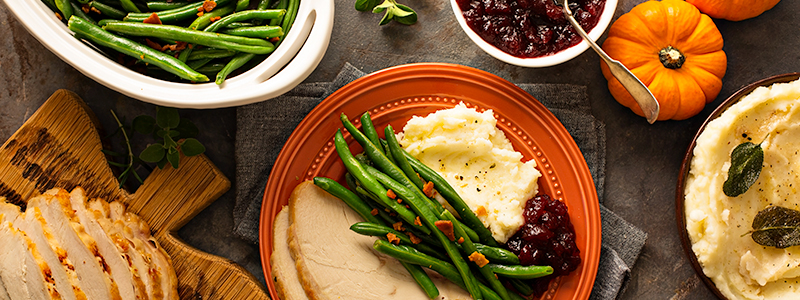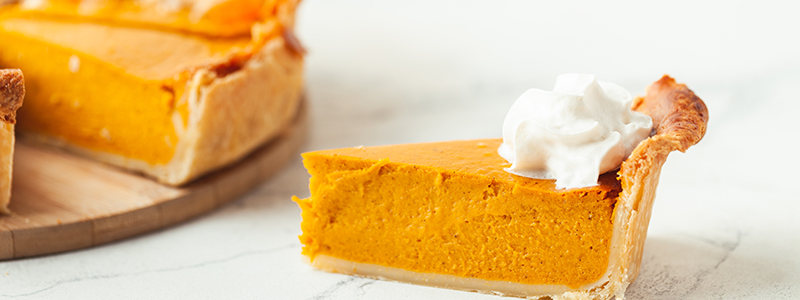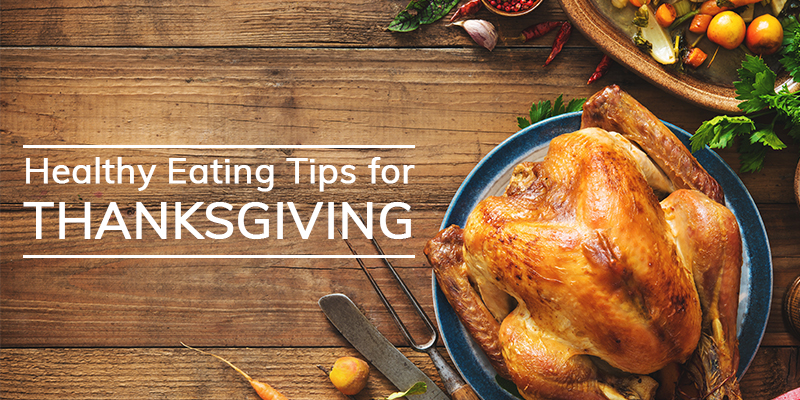Thanksgiving is a day for enjoying time with loved ones, reflecting on what we have to be grateful for, and eating a LOT of food. On average, Americans eat somewhere between 3,000 and 4,500 calories during their Thanksgiving meal. By comparison, the recommended daily calorie allowance is around 2,000 calories for women and 2,500 calories for men.
With an abundance of delicious food in front of you, it’s normal to be tempted to fill your plate and reach for seconds. Food is meant to be enjoyed, after all! However, if you are dieting or want to prioritize your health goals, we have some helpful tips to guide you on how to eat healthy on Thanksgiving.
How to survive Thanksgiving on a diet

Let’s get one thing straight – one day of indulgent eating will not derail your whole diet or overall health. It’s important to note that eating for pleasure is part of a healthy lifestyle. Focus on balance, planning ahead, making some lighter alternatives to some classic favorites, and you’ll have no reason to feel guilty for enjoying scrumptious holiday food.
Top 7 tips for a healthy Thanksgiving

01. Eat breakfast
It may seem counterintuitive, but one easy choice to have a healthy Thanksgiving is to eat breakfast. Many people skip breakfast (and lunch, depending on the timing of their holiday meal) to “save room” for the big meal later in the day. When you skip meals, you often end up so hungry that you overcompensate by eating too much. Eating a nutrient-rich breakfast full of protein and fiber will keep your energy levels up and help you feel fuller longer.

02. Stay hydrated
Thanksgiving dishes are often high in sodium. Drinking water will help flush out your body and alleviate discomfort from bloating. Adding soups to your holiday meal plans are another way to boost your hydration.

03. Avoid alcohol
Not only does alcohol add to the overall calorie count, but there is also some evidence that drinking alcohol stimulates appetite once we’ve started eating. That, combined with how consuming too much alcohol can lower inhibitions, may lead to overeating.
If you are going to drink alcohol on Thanksgiving, consider the size of your glass or the size of the pour. A “drink” is technically 5 ounces, but that will look different depending on the glass, and some people pour more heavily. Another way to limit your intake of alcohol is drinking a glass of water between each alcoholic beverage.

04. Balance your plate
A balanced meal includes lean protein, good fats, and healthy carbohydrates. This is an optimal mix to stabilize your blood sugar, keep your metabolism moving, and give your body the nutrients it needs.
Thanksgiving meals have so many options to select from. Choose the leaner cuts of turkey (white meat) and staples like green beans, sweet potatoes, squash or brussel sprouts. These have all likely been cooked in butter, giving you quality fat as well. Avoid crowding your plate with dishes with excessive starch or sugar.

05. Pitch in!
If you know there won’t be many healthy choices at your dinner table, then make a dish or two to bring. Not only will you feel better about what you’re eating, you’ll be giving your loved ones healthier options as well.

06. Practice mindful eating
Slow down. Focus on savoring and noticing everything about each bite of your food: the textures, flavors, and smells. Research shows that a lack of focused attention on the act of eating can cause you to consume more food. Taking your time to eat mindfully will make you even more grateful for all the Thanksgiving dishes and those who prepared them.

07. Take a walk between dinner and dessert
For some families, a post-dinner stroll is an annual tradition. But this is more than simply a way of bonding with loved ones on Thanksgiving. The feeling of being full can lag somewhat. If you go straight from the meal to eating dessert, your brain may not have enough time to register how full your stomach really is. Taking a short walk will help your body digest, and you’ll probably enjoy dessert more if you aren’t feeling totally stuffed.
Healthy Thanksgiving sides

On Thanksgiving, the turkey may get all the attention, but many people know this meal is all about the sides! We’re talking about all the beloved classics like stuffing, sweet potato casserole, green bean casserole, mashed potatoes, gravy, and cranberry sauce. We understand some family recipes are sacred and should never be changed or replaced. However, there are many ways to better align these traditional dishes with your health goals.
Stuffing
Normally made with white bread, we suggest swapping all or half of that out for whole wheat bread. Use low-sodium chicken broth, and maybe sneak in some extra vegetables like carrots, mushrooms, or peppers.
Sweet potato casserole
Grandma may love making this family favorite topped with marshmallows, which are often a highly processed, sugar-filled food. Try substituting the marshmallows with pecan halves spiced with cinnamon, a little brown sugar and a pinch of salt. This way, you can control the sugar content and add some crunch. You may find people like it better than the original marshmallow fluff!
Green bean casserole
Forget the canned cream of mushroom soup as the sauce for green bean casserole and make your own! You can easily make a healthier version of this with low-sodium chicken or vegetable broth, half-and-half (or coconut milk if you have dairy-free folks at your table), flour (all-purpose, whole wheat or gluten free), parmesan, and garlic.
Mashed Potatoes
Mashed potatoes are carb central and oh so delicious. An easy way to make these kinder on your diet is to use whole or low-fat milk or half-and-half rather than heavy cream. Just make sure to watch the salt content! Need a low-carb option? Consider making mashed cauliflower, parsnips, or rutabaga instead.
Gravy
Traditional gravy is typically a high-fat, high-sodium and carbohydrate-rich sauce. Packaged gravies tend to contain a lot of salt, artificial ingredients, and even sugar. To reduce the fat content, use more chicken stock and less of the turkey drippings. Use low-sodium broth and whole wheat or gluten-free flour for the roux. Want your gravy creamy? Add milk rather than cream or cheese. Lastly, add lots of fresh herbs and maybe sneak in some finely chopped onion and garlic to add a rich flavor.
Cranberry Sauce
Do your loved ones prefer cranberry sauce from scratch or canned? This can cause a great divide in some houses. If you want a healthy option for your family, make it from scratch. That way, you’ll have more control over the sugar level. Adjust the sweetness of your homemade cranberry sauce by using more freshly-squeezed orange juice and maple syrup or honey rather than refined white sugar.
We’re getting hungry already! So remember this if you want to eat healthy on Thanksgiving: balance your plate with lean protein, lots of nutrient-rich veggies, and a small portion of healthy carbohydrates. You don’t have to say “yes” to every dish on the table.
Healthy Thanksgiving desserts

We’ve all been in that post-meal coma, only to be faced with the smell of a fresh pumpkin pie coming from the oven. Eating healthy on Thanksgiving could include avoiding dessert entirely if you choose, but if you plan to partake, there are easy strategies to follow to make these recipes more health-conscious.

Reduce the sugar
A lot of recipes call for more sugar than necessary. Try cutting the amount of sugar in the recipe by at least 10 to 25 percent. Swap refined white sugar for other natural sweeteners like coconut palm sugar, stevia, maple syrup or honey if you can.

Bring on the fruit
Skip the carb-loaded cakes and enjoy the dessert offerings that are more fruit-forward, like apple pie or berry cobbler.

Add some fiber
Does your recipe call for all-purpose flour? Refined flours are highly processed and lack nutrients. Try substituting some whole wheat or even gluten-free flour as an alternative. Not all flours are a 1:1 ratio for substitution in baking, so make sure to research this before you try it!
We’re here for you 365 days a year
Emergencies can happen at any time, even on Thanksgiving. Should the need arise, your Best Neighbors Ever are here to provide extraordinary emergency care for you and your loved ones 24/7/365. Find your nearest Neighbors!

